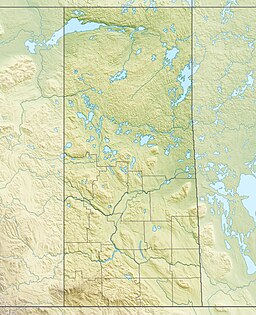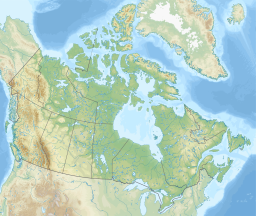Attitti Lake
| Attitti Lake | |
|---|---|
 Attitti (centre) and surrounding lakes | |
| Location | |
| Coordinates | 55°07′N 102°27′W / 55.117°N 102.450°W |
| Part of | Saskatchewan River drainage basin |
| Basin countries | Canada |
| Surface area | 2,758 ha (6,820 acres)[1] |
| Max. depth | 48 m (157 ft) |
| Shore length1 | 172 km (107 mi) |
| Surface elevation | 362 m (1,188 ft) |
| Settlements | none |
| 1 Shore length is not a well-defined measure. | |
Attitti Lake[2] is a lake in the Canadian province of Saskatchewan. It lies in low-relief forested terrain of the Canadian Shield. The climate is sub-arctic.
Location
[edit]Attitti Lake is at 55°08′00″N 102°28′02″W / 55.1334°N 102.4671°W, at an elevation of 362 metres (1,188 ft).[3] The lake is northwest of Flin Flon, Manitoba and about 48 kilometres (30 mi) east of Pelican Narrows, Saskatchewan. It is connected by a winter road with Kakinagimak Lake, Wildnest Lake, and Hanson Lake via Highway 106, which runs 3.2 kilometres (2 mi) south of Wildnest Lake.
It can be reached by canoe from Pelican Narrows via Wunehikun Bay and Waskwei Lake, and is connected to most of the surrounding lakes by well-maintained portages.[4]
Terrain
[edit]The area is typical of the flat-surfaced part of the Canadian Shield, with low hills that rarely rise as much as 30 to 46 metres (100 to 150 ft) above the lakes.[4] The terrain consists of roughly parallel sinuous ridges of outcrop separated by muskeg, drift and lakes.[4] The channel that connects Attitti Bay with Attitti Lake is underlain by a north-trending fault zone.[5] Geologically the area is in the Precambrian Kisseynew complex, underlain by an assemblage of metamorphosed sedimentary rocks that has been intricately folded, with intrusions of sill-like granitic bodies.[6] Metamorphism in the area appears to have peaked about 1807 million years ago. There is significant economic potential for volcanogenic massive sulfide and gold mineralization.[7]
The area has parts of three different drainage basins. Robbestad Lake, McArthur Lake, and the northern part of Kakinagimak Lake drain northward into the Churchill River via the Nemei River. The southern part of Kakinagimak Lake, and Dezort Lake, Dougherty Lake, Wildnest Lake, and Pearson Lake drain south into the Wildnest-Sturgeon-Weir River System, then into the Saskatchewan River. The rest of the area drains into Attitti Lake, which drains eastward through Waskwei Lake, Wunehikun Bay, Mirond Lake and the Sturgeon-Weir River System into the Saskatchewan River System.[4]
Environment
[edit]The lake is in the subarctic climate zone.[8] The annual average temperature is −2 °C (28 °F). The warmest month is July, when the average temperature is 16 °C (61 °F) and the coldest is January, with −22 °C (−8 °F).[9] The lake is surrounded by coniferous forest.[10] The trees are mainly black spruce (Picea mariana), jack pine (Pinus banksiana), poplar (populus), and scattered balsam (populus balsamifera). Trees average more than 6.1 metres (20 ft) in height.[4] There are small patches of moss-covered muskeg that support laurel (kalmia microphylla), labrador tea, and scattered larch, and black spruce.[11]
Animals hunted for meat or fur include moose, woodland caribou, black bear, beaver, otter, and muskrat. Spruce partridge are common.[11] There is a fly-in fishing lodge on the lake, which has a good population of lake trout, northern pike, and walleye.[12]
See also
[edit]Notes
[edit]- ^ "Attitti Lake Fishing Map". Bist LLC. Retrieved 9 October 2024.
- ^ "Attitti Lake". Canadian Geographical Names Database. Government of Canada. Retrieved 8 October 2024.
- ^ Attitti Lake – Mapcarta.
- ^ a b c d e Pyke 1961, p. 5.
- ^ Pyke 1961, p. 20.
- ^ Pyke 1961, p. 8.
- ^ Ashton, Balzer & Tran 1995, p. 27.
- ^ Peel, Finlayson & McMahon 2007.
- ^ Dataset Index – NASA.
- ^ Land Cover Classification – NASA.
- ^ a b Pyke 1961, p. 6.
- ^ Riege.
References
[edit]- Ashton, K.E.; Balzer, S.S.; Tran, H. (1995), "Geology of the Galbraith·Attitti lakes area, Attitti Block (part of 63M·1 and -2)", Summary of Investigations 1995 (PDF), Saskatchewan Geological Survey, Sask. Energy Mines, retrieved 25 June 2018
- "Attitti Lake", Mapcarta, retrieved 24 June 2018
- "Dataset Index", NASA Earth Observations Data, NASA, archived from the original on 6 March 2015, retrieved 30 January 2016
- "Land Cover Classification (1 year)", NASA Earth Observations Data, NASA, archived from the original on 31 August 2016, retrieved 30 January 2016
- Peel, M C; Finlayson, B L; McMahon, T A (2007), "Updated world map of the Köppen-Geiger climate classification", Hydrology and Earth System Sciences 11, doi:10.5194/hess-11-1633-2007
- Pyke, M. W. (1961), The Geology of the Attitti Lake Area (West Half) Saskatchewan (PDF), Saskatchewan Department of Mineral Resources, archived from the original (PDF) on 9 November 2018, retrieved 24 June 2018
- Riege, Bob, "DeerHorn Lodge, Best Kept Fishing Secret", Walleye Central, retrieved 24 June 2018


